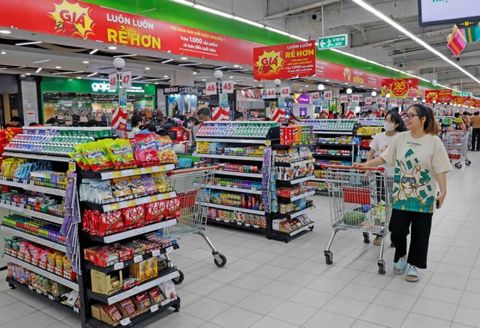
People shop at Big C Thăng Long Supermarket in Hà Nội. — VNA/VNS Trần Việt
To ensure the supply of goods and stabilisation of the domestic market by the end of 2023 and Lunar New Year 2024, the Ministry of Industry and Trade (MoIT) will coordinate with large distributors to regulate the supply of goods and support the consumption of agricultural products, according to Lê Việt Nga, MoIT’s deputy director of the Domestic Market Department.
The ministry will work with the Ministry of Agriculture and Rural Development to monitor the supply and demand of essential agricultural products, focusing on livestock, vegetables, and fruits.
It also coordinates with other ministries, branches, people's committees, and relevant offices across the country to remove difficulties in circulation and distribution of goods to avoid supply chain disruptions of essential goods, especially in large cities such as Hà Nội, HCM City, and Đà Nẵng, Nga said.
MoIT will coordinate with other ministries and branches in advising on price management of state-controlled goods, including petroleum products, to contribute to controlling inflation under the Government's goals.
The ministry and relevant agencies will strengthen programmes on consumption stimulation, connection of agricultural products, and regional specialities consumption, especially commodities consumed a lot at the end of the year and the Lunar New Year, she said.
It will strengthen inspection and management of business establishments, wholesale and retail markets, and warehouses as well as selling prices to ensure supply and avoid hoarding.
In addition, the ministry also regularly organises interdisciplinary inspection teams to check the work of ensuring food safety, product quality, and listed selling prices.
The ministry requests localities, businesses, and relevant agencies to review the supply and demand of goods, and develop plans on preparing goods for Tết. They also should implement a market stabilisation programme focusing on the supply of essential foods at stable prices, and a programme to bring Vietnamese goods to rural, mountainous, and island areas.
Some localities and businesses have made plans to prepare goods and stabilise the market at the end of the year and the Lunar New Year, including Hà Nội and HCM City. Some others are developing those plans to ensure the supply of essential goods at reasonable prices.
In the first nine months of 2023, the domestic market has been relatively stable with a consistent supply of domestic goods. Purchasing power in the market has recovered well compared to previous years and the period of the COVID-19 pandemic, according to Nga.
This year, the weather has been stable and favourable for agricultural production, so the supply of food, vegetables, and fruits is abundant, and prices do not fluctuate significantly, Nga said.
She said domestic prices of essential goods are not expected to experience unusual fluctuations. This year, people, especially middle-income households, will tend to mainly spend on essential goods. So, demand during Tết is not expected to increase suddenly. Prices at the end of the year are forecast to increase according to market rules but will not rise unusually high.
Enterprises participating in the market stabilisation programme always commit to selling at stable prices, or 5-10 per cent lower than market prices. If the prices increase due to higher transportation costs and raw materials, they will report to the Department of Finance.
In the first eight months of this year, the total retail sales of goods and services reached about VNĐ4 quadrillion, an increase of 10 per cent year-on-year over the same period last year. — VNS